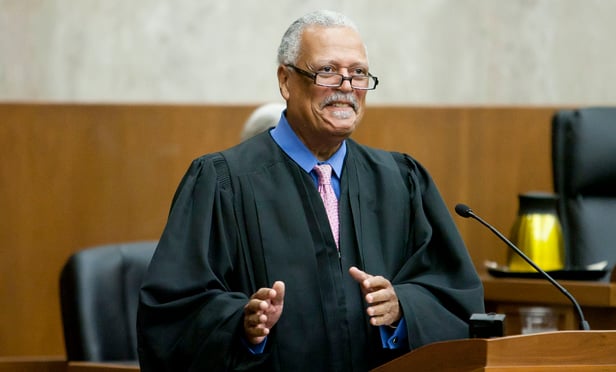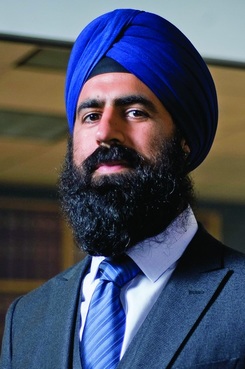2 Amicus Briefs Played Big Roles in Latest 'Emoluments' Ruling Against Trump
"The court appreciates the illuminating analysis provided by the amici," U.S. District Judge Emmet Sullivan in Washington wrote.
May 01, 2019 at 06:48 PM
6 minute read
 Judge Emmet Sullivan, U.S. District Court for the District of Columbia. Photo: Diego M. Radzinschi/ALM
Judge Emmet Sullivan, U.S. District Court for the District of Columbia. Photo: Diego M. Radzinschi/ALM
In the fight over whether President Donald Trump is violating the Constitution's ban on accepting gifts or payments from foreign states, U.S. District Judge Emmet Sullivan relied on evidence from legal historians and former government ethics officers to move Congressional Democrats' lawsuit against the president over a major hurdle.
“I think as a general matter [Sullivan's] opinion is a testament to how important amicus briefs can be to a case,” said Brianne Gorod, chief counsel to the Constitutional Accountability Center, who argued on behalf of the 200 Democratic lawmakers in the case Blumenthal v. Trump.
Sullivan, who's served on the U.S. District Court for the District of Columbia since 1994, denied the U.S. Justice Department's motion to dismiss the lawmakers' claims that Trump, through his private business holdings, is allegedly violating the foreign emoluments clause in the Constitution. That clause, designed to protect against foreign corruption, requires federal officeholders to obtain the consent of Congress before accepting any benefits from foreign states.
In his 48-page opinion, Sullivan adopted the broad definition of “emoluments” sought by the challengers after finding the government's narrower definition “unconvincing” and “inconsistent” with the “text, structure, adoption, historical interpretation, and purpose of the Clause, as well as Executive Branch practice.”
The lawmakers drew support from six amicus briefs, but two in particular—by legal historians and former government ethics officials—carried the day in the judge's analysis of the definition of emoluments and the clause's scope; the consequences of adopting a broad definition, and how the clause has been applied by the executive branch over time.
“The court appreciates the illuminating analysis provided by the amici,” Sullivan said in his ruling.
Melissa Maxman, managing partner of the Washington office of Cohen & Gresser, was counsel to the five historians who claimed the Justice Department “cherry-picks from two insignificant dictionaries and from the historical sources, despite a mountain of evidence to the contrary” for its narrow definition of emoluments.
They countered that an “investigation of English language dictionaries published from 1604 to 1806, of the influential writings of Blackstone, Pufendorf, and Adam Smith, and of the contemporary usage by the Founding generation in the constitutional debates and in their private writings all confirm a broad definition of the word.”
“When you're working with legal historians, you kind of let them take the rope and run with it,” said Maxman, an antitrust litigator. “I don't claim to be a legal historian. They really wrote it.”
Sullivan was persuaded that the “weight of the evidence” in “founding-era dictionaries and other contemporaneous sources” supported the position advocated by the historians and the lawmakers.
The historians' brief also played a key role in another emoluments clause ruling by U.S. District Judge Peter Messitte of Maryland in the case District of Columbia and Maryland v. Trump. That case focuses on alleged violations of the foreign and domestic emoluments clauses related to Trump's ownership of the Trump International Hotel in Washington.
A three-judge panel of the U.S. Court of Appeals for the Fourth Circuit heard arguments in March on the government's appeal of Messitte's ruling that the attorneys general of D.C. and Maryland have standing to sue Trump. No decision has issued yet.
Maxman said she was not surprised the brief played a prominent role in both cases. “I thought it showed both judges are looking to traditional legal sources to interpret the meaning of currently unused terms in U.S. legal jargon,” she said. “We got into the veins and leaves on the trees and came to the right answer.”
 Tejinder Singh. Photo: Diego M. Radzinschi/ALM
Tejinder Singh. Photo: Diego M. Radzinschi/ALMSullivan said he also found convincing arguments by 11 former government ethics officers in a brief filed by Tejinder Singh, partner in Goldstein & Russell. He countered the government's claims that a broad definition of emoluments would result in “absurd consequences.”
The ethics officials told Sullivan that the government applies a “totality-of-the-circumstances” approach to emoluments clause questions “with a bias in favor of breadth, and a keen eye to the anti-corruption purpose of the clause.”
The judge also looked to opinions by the Justice department's office of legal counsel and the Comptroller General as sources for how “emolument” is defined and how the clause has been interpreted and applied by the executive branch. What he discovered, Sullivan said, “clearly supports” arguments made by the lawmakers and the former ethics officers rather than those by the president.
For courts confronting the emoluments clauses for the first time, there could be concerns that the clauses, as the government governed, are impractical to enforce or to determine the “metes and bounds” of the president's obligations, said Goldstein & Russell's Singh.
“We sought to reassure the court that was not true,” he said. “Government officials in every branch have been complying with these clauses for decades now with the assistance of their ethics officials. They can be practically applied; they're not difficult to apply, and they're important to good governance.”
Singh called “very heartening” to see the district court citing and quoting from the former ethics officers' brief. “That's unusual for an amicus, but it shows their expertise was of value to the court.”
The judge turned to two other amicus briefs in his analysis: seven separation of powers scholars by Katharine Mapes, partner in Spiegel & McDiarmid; 16 federal jurisdiction and constitutional law scholars by Corey Roush, partner in Akin Gump Strauss Hauer & Feld.
A third emoluments clause lawsuit, CREW v. Trump, was dismissed on standing grounds in December 2017 and is pending decision on the appeal in the U.S. Court of Appeals for the Second Circuit.
Sullivan's ruling in Blumenthal v. Trump is posted below:
Read more:
Trump's Morgan Lewis Tax Lawyer Faces House Scrutiny
Senior DOJ Appellate Lawyer Jumps to US House General Counsel's Office
DC Circuit Won't Force IRS to Release Trump's Tax Returns
DOJ Asks 4th Circuit to Halt State AG Emoluments Lawsuit
Congressional Democrats' Emoluments Suit Against Trump Clears Hurdle
Trump's DOJ Is 'Misleading' Court in Emoluments Suit, New Study Claims
This content has been archived. It is available through our partners, LexisNexis® and Bloomberg Law.
To view this content, please continue to their sites.
Not a Lexis Subscriber?
Subscribe Now
Not a Bloomberg Law Subscriber?
Subscribe Now
NOT FOR REPRINT
© 2025 ALM Global, LLC, All Rights Reserved. Request academic re-use from www.copyright.com. All other uses, submit a request to [email protected]. For more information visit Asset & Logo Licensing.
You Might Like
View All
Brownstein Adds Former Interior Secretary, Offering 'Strategic Counsel' During New Trump Term
2 minute read
Weil, Loading Up on More Regulatory Talent, Adds SEC Asset Management Co-Chief
3 minute read
FTC Sues PepsiCo for Alleged Price Break to Big-Box Retailer, Incurs Holyoak's Wrath
5 minute read
Supreme Court Will Hear Religious Parents' Bid to Opt Out of LGBTQ-Themed School Books
Trending Stories
Who Got The Work
J. Brugh Lower of Gibbons has entered an appearance for industrial equipment supplier Devco Corporation in a pending trademark infringement lawsuit. The suit, accusing the defendant of selling knock-off Graco products, was filed Dec. 18 in New Jersey District Court by Rivkin Radler on behalf of Graco Inc. and Graco Minnesota. The case, assigned to U.S. District Judge Zahid N. Quraishi, is 3:24-cv-11294, Graco Inc. et al v. Devco Corporation.
Who Got The Work
Rebecca Maller-Stein and Kent A. Yalowitz of Arnold & Porter Kaye Scholer have entered their appearances for Hanaco Venture Capital and its executives, Lior Prosor and David Frankel, in a pending securities lawsuit. The action, filed on Dec. 24 in New York Southern District Court by Zell, Aron & Co. on behalf of Goldeneye Advisors, accuses the defendants of negligently and fraudulently managing the plaintiff's $1 million investment. The case, assigned to U.S. District Judge Vernon S. Broderick, is 1:24-cv-09918, Goldeneye Advisors, LLC v. Hanaco Venture Capital, Ltd. et al.
Who Got The Work
Attorneys from A&O Shearman has stepped in as defense counsel for Toronto-Dominion Bank and other defendants in a pending securities class action. The suit, filed Dec. 11 in New York Southern District Court by Bleichmar Fonti & Auld, accuses the defendants of concealing the bank's 'pervasive' deficiencies in regards to its compliance with the Bank Secrecy Act and the quality of its anti-money laundering controls. The case, assigned to U.S. District Judge Arun Subramanian, is 1:24-cv-09445, Gonzalez v. The Toronto-Dominion Bank et al.
Who Got The Work
Crown Castle International, a Pennsylvania company providing shared communications infrastructure, has turned to Luke D. Wolf of Gordon Rees Scully Mansukhani to fend off a pending breach-of-contract lawsuit. The court action, filed Nov. 25 in Michigan Eastern District Court by Hooper Hathaway PC on behalf of The Town Residences LLC, accuses Crown Castle of failing to transfer approximately $30,000 in utility payments from T-Mobile in breach of a roof-top lease and assignment agreement. The case, assigned to U.S. District Judge Susan K. Declercq, is 2:24-cv-13131, The Town Residences LLC v. T-Mobile US, Inc. et al.
Who Got The Work
Wilfred P. Coronato and Daniel M. Schwartz of McCarter & English have stepped in as defense counsel to Electrolux Home Products Inc. in a pending product liability lawsuit. The court action, filed Nov. 26 in New York Eastern District Court by Poulos Lopiccolo PC and Nagel Rice LLP on behalf of David Stern, alleges that the defendant's refrigerators’ drawers and shelving repeatedly break and fall apart within months after purchase. The case, assigned to U.S. District Judge Joan M. Azrack, is 2:24-cv-08204, Stern v. Electrolux Home Products, Inc.










